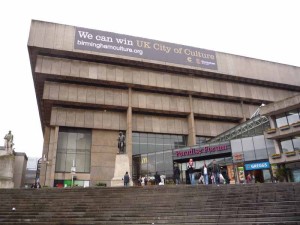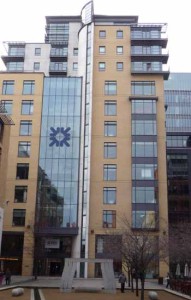Alan Clawley with a history lesson on Birmingham town planning and John Madin’s ’70s Birmingham Library
 Friends of the Library thought they had heard all the reasons why the Central Library had to be demolished, but at a meeting on 8 August this year they heard Councillor McKay, Cabinet Member for the ‘Clean Green & SMART City’ make a new claim that it was ‘sustainable’ to knock it down and redevelop Paradise Circus to cut future CO2 emissions and create new jobs and prosperity for future generations.
Friends of the Library thought they had heard all the reasons why the Central Library had to be demolished, but at a meeting on 8 August this year they heard Councillor McKay, Cabinet Member for the ‘Clean Green & SMART City’ make a new claim that it was ‘sustainable’ to knock it down and redevelop Paradise Circus to cut future CO2 emissions and create new jobs and prosperity for future generations.
To be fair, an economic case of sorts was made around 2000, but no figures of jobs to be created have ever been published. Now Councillor McKay says the council will use the Enterprise Zone to fund the redevelopment.
Looking back, the ’90s was a decade when the Council’s plans for business tourism and regeneration came to fruition but it was also a time when Labour showed some weariness with prestige projects by electing Theresa Stewart as Leader. Stewart was keen to get away from the era of grand projects and focus instead on social services. The ICC, Symphony Hall, Hyatt Hotel and NIA were completed and the Central Library entered its third decade with the council spending money on repairing its leaking roof and enclosing its central atrium.
Building work was started at Brindleyplace in 1993. In the latter half of the decade the appearance of an ensemble of new buildings there including the Ikon Gallery in the adapted Victorian school building began to make the thirty-year old Central Library look dated. Two years after her election Cllr Stewart opened the relatively modest ‘Centre for the Child’ in the Central Library after a fire had destroyed the childrens’ library in the basement. No maintenance or cleaning had been carried out since the Library had been opened and the concrete cladding panels were unevenly stained by the weather.
In 1994 Gary Taylor Joined Argent and Vivien Griffiths was appointed Assistant Director Libraries and Learning. Tony Blair and New Labour Party took over the Government in 1997 and two years later Councillor Albert Bore replaced Theresa Stewart as Leader of the Labour Group. Bore presided over the development of a new policy on Paradise Circus. A working group of senior council officers was established. Its members were Vivien Griffiths (Libraries), Mike Taylor, Geoff Wright (Planning), Tony Liddiard (Property) and Julie Leah. John Dolan was the principal Librarian at the time. They proceeded on the basis that the Central Library was in a poor condition, even admitting that was because the Council had failed to put aside enough money to properly maintain it. The idea of redeveloping Paradise Circus was seen as a way of financing either a refurbishment programme that the Council could not currently afford from its own budgets or a new replacement financed by means as yet unknown.
But, crucially for the future of the Library, in the last year of the decade the Council adopted a new policy to supercede ‘Business Tourism, ‘Sports Tourism’ and the increasingly fashionable ‘Food Tourism’ exemplified by the annual German Market. The Council was still out to woo businesses to Birmingham, but, perhaps inspired by the success of Brindleyplace in attracting the Royal Bank of Scotland to occupy most of the new office buildings, was now keen to persuade big international corporations to re-locate their headquarters to the city centre where they would find plenty of speculative top-grade office blocks to let. The council earmarked Paradise Circus as the prime location for its scheme, undoubtedly because it still owned most of the land there and could expect to make a healthy return by selling it to a private property developer. The Library happened to sit on that part of the site that would be most attractive to a developer. If the policy was to succeed the library and all the other accretions would have to go.
The council was advised that the policy would not be easy to achieve as Birmingham would be competing with other cities in the UK and throughout the developed and developing world. They would have to be first off the block to stand a chance. Furthermore implementing this policy was radically different from that of Business Tourism of the previous decade. Then the City Council was able to control the process, raise capital and to build and manage the facilities that were necessary to attract paying customers. This was successful whilst few other cities had their own convention centres, but by the end of the 90s every city in the UK was competing for the same conference business. It was no doubt the diminishing returns from Business Tourism that led the Council to adopt the new policy.
At this stage the council had not agreed where a new library would be built or how big it would be. Seven sites and a refurbishment option were examined and given scores as follows;
| Site | area | score |
| Paradise Circus | 1.7 acres | 77 |
| Eastside | 1.32 acres | 72 |
| Refurbishment of existing Central Library | 68 | |
| Navigation Street | 64 | |
| Science Museum/Charlotte Street | 2.5 acres | 63 |
| Holliday Street/Arena Central | 2.3 acres | 62 |
| Centenary Square (Car Park) | 0.9 acres | 56 |
John Dolan, recently awarded an OBE, expressed his preference for Paradise Circus but was overruled as Eastside, the second best option, was subsequently pursued. The refurbishment of the existing building, still in the running at this stage, came third. Centenary Square car park – that was eventually chosen by the Conservative/LibDem council in 2006 after abandoning Eastside – was bottom of this list. A briefing note to the Leader in December confirmed that the idea of a major private sector redevelopment of the whole of Paradise Circus that had first been proposed in November 1999 ‘justified further consideration’. Part of this consideration was of course ‘finance’. The working group of officers took advice from private property professionals (hired for an initial fee of £55,000) who told them that although their calculations showed a nett estimated deficit of £20 to £25 million, against the alternative costs of refurbishment of the existing Library and the volatility of the property market/likely increases in value, ‘this is of an order where it appears worthwhile to test the market’. This advice was enough to persuade the Leader to push ahead with the idea. A note to Cabinet summarised the position as follows:
‘The vision for Paradise Circus is a major long term project which is dependent on proving a very high level of private developer/funder interest but it is considered possible that such interest might be secured. Funding a new library and conservatoire almost wholly from enhanced property values is conceivable if a substantial mixed used development is planned and a replacement library and conservatoire can be resolved in advance’.
Such was the optimism at the dawn of the new century that it swept along almost every councillor of every party. Speaking in London in November 20000 Councillor Bore told his audience, ‘ Our initial horizon is 2008 – when we hope Birmingham will be designated European City of Culture. A priority is the creation of a new 21st Century library within the Eastside development to succeed the present Central Library at Paradise Circus. The new landmark contemporary library building, like the Guggenheim in Bilbao, will become an icon of our city.



